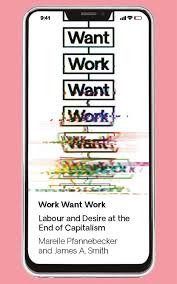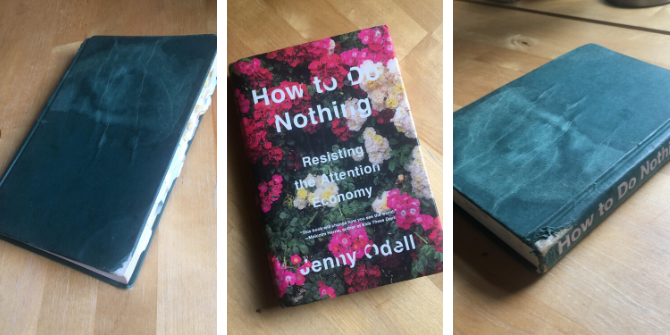In Work Want Work: Labour and Desire at the End of Capitalism, Mareile Pfannebecker and J.A. Smith address the problems in the prevailing discourse on work and outline how exactly we can put a post-work future into practice. As 2020 has witnessed the reshaping of work and workplaces due to the COVID-19 pandemic, this thought-provoking book offers a valuable starting point for envisaging a future post-work world, writes Anupama Kumar.
Work Want Work: Labour and Desire at the End of Capitalism. Mareile Pfannebecker and J.A. Smith. Zed Books. 2020.
 In Work Want Work: Labour and Desire at the End of Capitalism, Mareile Pfannebecker and J.A. Smith ask how exactly we can put a post-work future into practice.
In Work Want Work: Labour and Desire at the End of Capitalism, Mareile Pfannebecker and J.A. Smith ask how exactly we can put a post-work future into practice.
The authors present three distinct strands of thought on why the current discourse on work is problematic. The first is the gradual shift to a lifework regime. John Maynard Keynes famously argued that in the future, people would only work fifteen hours a week. This has not come to pass – if anything, our lives have got busier. Pfannebecker and Smith begin by noting that every part of human existence has been turned into work. Workers are now required to be available around the clock, and the distinction between work and non-work has broken down. They argue that there is a need to disengage from this ‘lifework’ regime and to reclaim ‘un-working’ as a part of life.
The lifework regime has come about for several reasons. Today, even white-collar tasks are subject to automation and no longer retain the level of ‘professional’ distinction as they did previously. Where professionals such as lawyers, teachers or journalists were once able to play a gatekeeping role over culture, today their work ‘uniquely is crowded out by interchangeable bureaucratic tasks and ‘‘customer facing’’ affective labour’. In other words, they are no longer seen as trained professionals, but as workers who possess a series of isolatable ‘skills’.
Meanwhile, the nature of work done by these professionals has shifted to a series of bureaucratic tasks. These are ‘bullshit jobs’ (drawing here on the work of the late anthropologist and activist David Graeber), which are jobs that contribute nothing of value to the world, but take up time and effort on the part of the worker. More and more work comprises ‘immaterial labour’, or work that does not generate visible products. The authors cite examples of cognitive labour, such as that performed by a data entry operator, or the emotional labour of a flight attendant, as examples of immaterial labour which are vulnerable to exploitation.

The second chapter refers to the ways that the current work regime is used against citizens. Social protection programmes in the post-war era were premised on waged work done by persons – benefits such as pensions were made available to workers rather than citizens. The authors argue that this had two deleterious effects. One, it universalised work, in that social protections were only available to those in formal employment. Two, it essentialised work, meaning that only formal, structured employment was seen as work, and ‘the family’ was now a nuclear family with a male breadwinner. Other types of families and work – women-led families, for instance, or the work performed by sex workers – were delegitimised.
However, work by itself cannot guarantee income or even a decent standard of living. In today’s world, value is made by rents on intellectual property (such as control over software or data), rather than by the labour performed by workers. The authors note that many workers are gainfully employed but earn insufficient income to live on (‘malemployment’), while many others lack work, but do not figure in official employment statistics (‘disemployment’). Even as the highest-ranking workers – top executives, for instance – work longer and longer hours for high incomes, many of those lower down are unable to work enough.
Pfannebecker and Smith then criticise the notion that work is a valid means of identifying those who deserve state assistance and the way that benefits have a negative connotation. In the UK, jobseekers are required to do unpaid work in order to receive benefits – a direct consequence of the idea that those who receive social benefits are somehow lazy or need to be taught to work. The Universal Credit system of benefits in the UK relies on a number of sanctions, where a beneficiary’s monetary benefits may be reduced for various reasons. The authors argue that it is not possible to reconcile the use of benefit sanctions with the state’s duty to provide a minimum standard of living.
Third, the authors argue that the treatment of work by the state exists alongside the commodification of individuals and their online presence. The authors position the treatment of work by the state in contrast to work and wages in the digital world. Not only does our online presence create ‘free data’ for large tech companies, but it also creates subjects who treat themselves as commodities. The ‘internet-famous’ actively monetise every aspect of their lives, including their free time – their leisure becomes their work.
Finally, the authors examine the links between ‘desire’ and work – in other words, how workers’ desires as consumers are malleable, even as their status as workers is precarious and almost disposable. Traditional anti-work theorists from Jean-Jacques Rousseau to Keynes have fallen victim to the ‘Jetsons fallacy’ – the idea that future desires can be measured with reference to present-day needs and desires. This is incorrect, say the authors, because our desires are ‘never simply our own’. They are shaped by the world around us. As Shoshana Zuboff argues in Surveillance Capitalism, platforms such as Amazon and Facebook do not just observe our thoughts and actions; they use algorithms to shape our desires. Pfannebecker and Smith reason that just as digital capitalism has blurred the lines between work and non-work, it has also blurred the lines between needs and wants. They call on their readers to re-shape their desires and to ask difficult questions about what we would really need in a post-work world.
I found Work Want Work to be a useful manifesto for how to envisage a post-work future; however, I also found that several questions were left unanswered. Does work have no place in the world at all? Scholars such as Pavlina Tcherneva have proposed that a universal job guarantee, where the government undertakes to provide work to those capable of working – especially if it creates tangible community assets – can itself be a worthy aim. Would the problems of lifework and malemployment not be addressed by more robust labour protections? Is it possible to provide all persons with productive work at a living wage – care work, for instance, or projects to promote the development of parks and common spaces in a community? Would this be a solution to the malemployment and meaningless Silicon Valley jobs that the authors describe?
Further, how do we ‘reshape our desires’? Certainly, there is a powerful argument against the kind of surveillance capitalism that Zuboff describes, where individuals become commodities generating data for tech companies. However, incomes are still essential to purchase food, shelter and clothing – in other words, we still need to earn enough to satisfy our needs. The authors hint that a Universal Basic Income may be one answer to this, but do not explain how this might be put into operation.
Work Want Work is a thought-provoking book for 2020, when COVID-19 has re-shaped work and workplaces. There is an urgent need to re-think work and the role that technology companies play in our lives. This book provides a valuable starting point for how to think about this future.
Note: This review gives the views of the author, and not the position of the LSE Review of Books blog, or of the London School of Economics.
Image Credit: Blue neon sign reading ‘Work Harder’.







